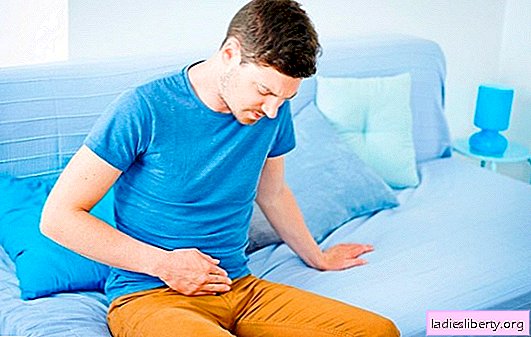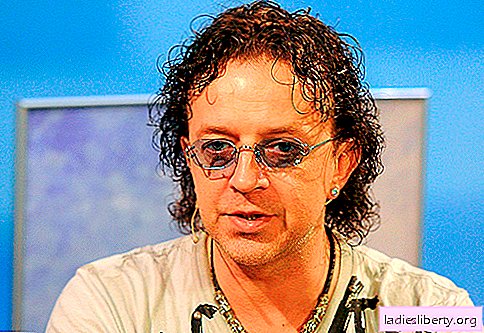
Inguinal hernia is a disease that is formed due to the penetration of part of the intestine into the inguinal canal. Due to the physiological structure, this type of hernia is more common in males. About the signs of inguinal hernia in men and methods for eliminating this ailment - later in the article.
Inguinal hernia in men: causes
Inguinal hernia can occur for a variety of reasons. The following factors are distinguished that can contribute to the appearance of this disease in men:
1. The hereditary predisposition of a person to inguinal hernia is detected in the anatomical weakness of the muscle tissue of the abdominal cavity.
2. Frequent (chronic) cough, which will exert a strong load and pressure on the weakened areas of the abdomen, which in turn can give an impetus to the formation of an inguinal hernia.
3. Excessive physical exertion, which exert strong pressure on the abdominal cavity (and increase the intra-abdominal pressure itself). Particularly dangerous is lifting weights, keeping something on weight, and also carrying heavy things in front of you.
4. Some diseases of the intestinal system can increase intra-abdominal pressure, especially when they cause constant constipation in a sick person.
5. Excess weight is able to give an excessive load on the internal organs, which increases the tendency of a person to inguinal hernia.
6. Earlier injuries of the groin area, which caused a sharp weakening of the ligaments and muscles.
7. Sudden weight loss leads to the fact that empty volumes form in the human peritoneum, which can be forced out of the abdominal cavity.
As can be understood from the above, several factors can contribute to the development of inguinal hernia in men, however, the most common cause of this disease is precisely weight lifting. He is most quickly able to lead to an acute condition of a person, in which he will need immediate treatment.
Inguinal hernia in men: the first symptoms and signs
At the very beginning of this disease, a person develops a small swelling in the groin area, which, together with the development of a hernia, will significantly increase in size. In this case, this swelling can change shape and protrusion. For example, if a person is lying, the protrusion will not be noticeable at all, and when he gets up, a characteristic bulging will be visible.
In the initial stages, a hernia usually does not cause pain, so many people go to the doctor even when the disease is running and causes terrible pain.
In general, pain and their absence largely depends on the complexity of the developing hernia. At the same time, some patients observe a strong burning sensation, which increases after physical exertion. Others may feel tingling and dull pain.
As the hernia grows and increases, it can cause discomfort and discomfort in a person.
In addition, the following additional symptoms that can develop in a person with an inguinal hernia are distinguished:
1. A feeling of pressure in the lower abdomen, especially before going to the toilet.
2. Fever and an increase in body temperature occur if the patient has developed severe inflammation and infection of the abdominal cavity.
3. Heart palpitations.
4. Nausea and vomiting occurs with untimely treatment.
5. Pain that radiates to the lower back and genitals.
6. The rumbling that occurs when the hernia is repaired. This happens in the initial stages of the disease. In a more neglected state, a person will no longer be able to independently correct a hernia.
7. If the hernia has a location that captures the bladder, the patient may be disturbed by pain in the lower abdomen and frequent urination.
8. Less commonly observed diarrhea or constipation.
9. In the event that the hernia affects not only the groin, but also the scrotum, a man may experience an increase in this organ.
Inguinal hernia in men: treatment
After diagnosing an inguinal hernia in men (its signs were discussed above), the attending physician almost always offers a traditional treatment option - hernia removal. This operation can be performed as a classic incision, and laparoscopically (by small punctures in the hernia).
In the event that the disease does not cause pain in a person and is in the initial stages, the operation may not be performed at all. It all depends on each specific case.
Immediately before the operation, the patient must undergo a complete diagnosis and consultation with several specialists (general practitioner, cardiologist, urologist, surgeon).
During the examination, the doctor should also monitor the condition of the hernia and the patient's symptoms. It is worth noting that sometimes in men an inguinal hernia can be confused with a femoral hernia and dropsy of the testicle.
This hernia surgery is performed under general anesthesia. If the procedure is not complicated and the hernia is not started, then it can be removed under local anesthesia. Its duration on average is 2-3 hours.
After the operation, antibiotics are prescribed to the patient. He should take them for another two weeks. At this time, it is advisable for a person to be in a hospital under medical supervision. Also, the patient must wear a restraining bandage that will keep the abdominal muscles in good shape and prevent the disease from repeating again.
After discharge home, a person is advised to comply with the following medical recommendations:
1. Avoid any physical activity for at least six months. At the same time, you can not lift anything heavy or do complex physical work.
2. Quit smoking and drinking alcohol.
3. Have more rest.
4. Monitor your weight and prevent obesity.
5. Follow a diet. In this case, the diet for the most part should consist of low-fat dishes of fish, meat, vegetables and fruits. Also very useful are seafood, cereals and dairy products.
6. Avoid overeating to prevent overstrain in the abdominal cavity. In this case, you need to eat often (4-5 times a day), but not in large portions.
7. Refuse foods that cause fermentation in the intestines (pickled vegetables, preservation, smoked products).
With proper observance of all medical recommendations, a person will be able to completely get rid of inguinal hernia.
Inguinal hernia in men: treatment, complications
Despite the fact that at first glance, inguinal hernia is not a threat and does not cause pain at first, it is considered a very dangerous disease that can lead to serious complications.
Most often, inguinal hernia contributes to the development of the following undesirable consequences:
1. Inflammation of the testicles.
2. Inflammation of the hernia itself.
3. Injury of the hernia, which can lead to death of the patient.
4. Bowel obstruction.
5. Violations in the male reproductive system.
6. Infection in the abdominal cavity.
It is possible to detect an infringement of a hernia by its characteristic signs - the detection of blood in the feces, sharp pains in the lower abdomen, nausea and vomiting. Also, in this condition, a person will no longer be able to independently fix a hernia.
In this case, the patient must immediately consult a doctor and carry out diagnostics, otherwise, otherwise, the consequences of pinching hernia can be very deplorable.
Inguinal hernia in men: prevention
Prevention of inguinal hernia in men consists in complying with the following medical recommendations:
1. You should regularly engage in sports activities that are aimed at strengthening the abdominal muscles. This can be a swing of the press, push-ups, pull-ups, etc. The main thing is that these workouts are regular.
2. Quit smoking, which contributes to chronic cough.
3. Eat properly to prevent obesity. It is also very important to lose weight reasonably and not to allow sudden weight loss. For this reason, if you want to bring your weight back to normal, you need to contact an experienced dietitian, so that he makes a balanced diet and weight loss plan.
4. You can not exert excessive loads on your body, especially lifting weights. When carrying heavy things, the load must be evenly distributed on both hands.
5. It is very important that when the first signs of an inguinal hernia appear, do not be shy about your problem and consult a doctor as soon as possible. The success of treatment will largely depend on this.











